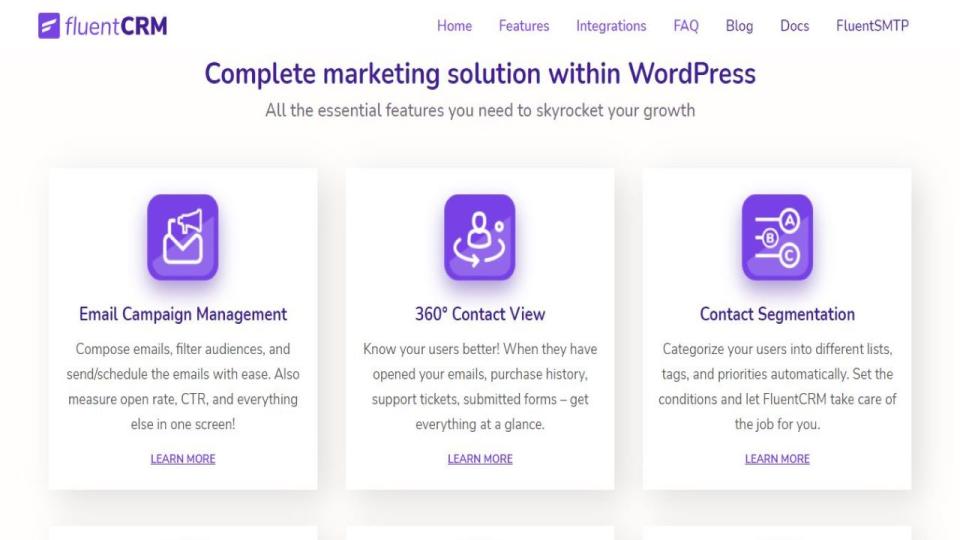What does a CRM system do?

Standing for customer relationship management, a CRM solution supports businesses in the monitoring, tracking, and analysis of all communications between the company and its customers. In doing so, it hope to nurture and enhance relationships with a company’s leads and clients.
The best CRM software solutions combine a multitude of features, from lead generation to contact management, in the hope of improving efficiency, sales productivity, and opportunities for collaboration.
Ultimately, what a CRM system does is up to the individual business and how they use it. There a few common CRM use cases that highlight the most common ways that CRM platforms are deployed. Below, we’ll explain in the simplest terms possible exactly what a CRM system does.

Reader Offer: Save 18% on Monday.com annual memberships
Monday.com is an easy-to-use and customizable work management platform, enabling teams of all sizes to plan, manage and centralize work. Get started now and boost your team's communication and productivity.
Preferred partner (What does this mean?) View Deal
What does a CRM system do?
Features

One of the simplest ways to understand what a CRM system does is to take a look at its features. One of the most important is contact management, which provides businesses with a centralized repository of all the relevant information pertaining to their customers. For organizations of significant scale, or those with ambitious growth plans, simply keeping track of all this information is challenging - let alone analyzing it.
That brings us to another important area of functionality for CRMs - analysis. In addition to collecting and collating customer information, CRMs can use sales analytics features to identify trends and unforeseen sales opportunities. Built-in reports and charts can also help businesses visualize this information so their sales and marketing teams can easily digest it. Tools like Salesforce, Workbooks, and HubSpot, for example, are some of the front-runners where analytics are concerned.
Other essential CRM features include workflow automation and pipeline management. Ultimately, these features are designed to boost sales numbers for a company - whether that’s by improving the productivity of the sales team, enhancing communication internally and externally, or assessing leads.
Examples
Another good way of understanding what a CRM does is to look at how the platforms have been used by companies previously. Businesses from all kinds of industries, from insurance to real estate and more, have benefitted from CRM solutions. A quick look at some high-profile CRM studies will demonstrate that.
Organizations including well-known multinationals and startups have shown that CRMs hold the potential to supercharge your sales. In the case of the former, Uber has used Salesforce to remain one of the giants of the technology world. The CRM collates data from all the individuals that engage with the Uber brand, with all interactions monitored. Data is really what keeps Uber as one of the most valuable companies in the world - and its CRM is what facilitates it.
A completely different type of business, WeightWatchers used HubSpot CRM to refine its sales process. Using the platform’s deal pipeline functionality, the company’s sales team was able to redefine the way it qualifies leads. The utilization of data-based optimization meant that employees no longer had to waste energy chasing low-quality leads and could focus their efforts on customers more likely to generate a return.
Another business that has utilized a CRM to great effect is BMW. As well as using CRM software to capture data from multiple sources, including dealerships, web pages, call centers, SMS, and direct marketing, BMW also leverages its CRM in its loyalty scheme, “The Owner’s Circle.” This program allows BMW owners to register their vehicles online and monitor their car’s financing and maintenance. All this helps to strengthen the post-purchase relationship between BMW and the customer. This exemplifies the way that CRM tools aren’t merely about boosting present-day sales figures; they can also strengthen relationships long into the future.
Benefits

The benefits that a CRM can deliver are another good way of explaining exactly what it can do. First of all, they can increase sales. A CRM tool can streamline sales processes, either through automation or simply by improving efficiency, so your sales team can focus on engaging with customers and nailing those conversion figures. A CRM can centralize sales data and provide clarity to your sales process through the provision of a step-by-step methodology that is flexible enough for it to be tweaked for different organizations.
CRM tools also help improve customer service. By managing contact and making all relevant customer information visible to all members of your sales team, CRMs can lead to a much more positive customer experience. There’s no need to scrabble around for information on previous interactions or purchase history if you’re employing a CRM. Everything your team needs should be stored and easily retrieved from a centralized repository. This makes things much easier for your employees and minimizes frustration for your customers.
Other benefits of a CRM include detailed analytics of your sales, lead nurturing, improved customer segmentation, and more accurate sales forecasting. Ultimately, it should make your sales run smoother and faster. The time between an individual engaging with your company for the first time and converting should decrease significantly.
Challenges
Although businesses shouldn’t focus overly on the difficulties of using a CRM, understanding the challenges can help explain how your chosen solution works. One of the challenges is ease of use. Do your sales or marketing teams have the necessary skills to make the most of a CRM? Some of the more advanced features of CRMs, whether they involve AI or analytics, might have steep learning curves.
Integration is another area where certain CRMs encounter issues. It’s likely that you’ll use a variety of different business tools in your organization so being able to seamlessly connect processes and data between them and your CRM is essential to a smooth-running sales pipeline. Understanding how a CRM connects with other tools is key to realizing what these solutions can really achieve.
How a CRM works in practice

There are several ways to think about how a CRM works in practice and this depends largely on how your business is using the tool. If you’re using a CRM to improve awareness of your brand, then the platform usually operates by helping businesses conduct research and then crafting marketing personas. If you're using a CRM to nurture leads, the platform works by providing information to assist your sales representatives when they are engaging with customers. Whether you’re providing support or looking for upselling opportunities, a CRM is more than just a nice to have. It provides real, tangible benefits for every step of the sales process.

